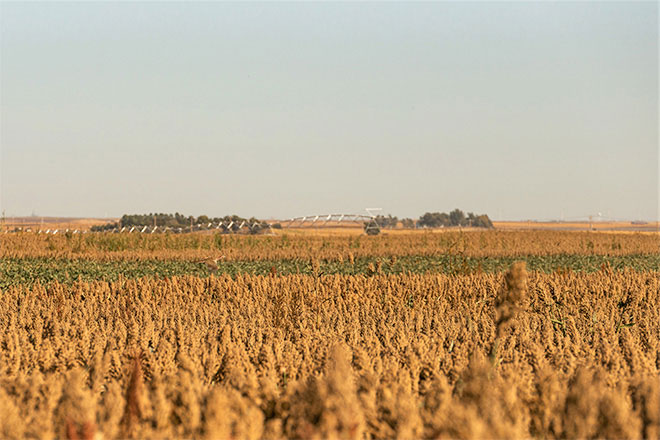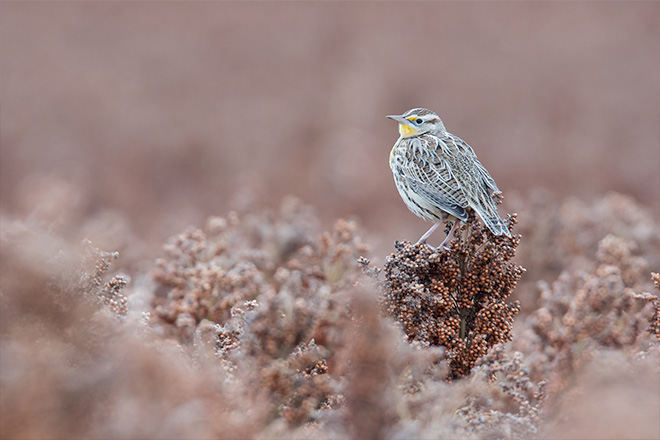Photos by Brittany Smith, Quail Forever
What are “Climate-Smart Commodities,” and how are Pheasants Forever and Quail Forever involved in a new program to increase them?
By Brent Rudolph
Climate change is a hot topic in conservation these days. News, opinions and deliberations range far and wide, and use acronyms and jargon that can be bewildering.
For those listening closely, emerging through all that noise is an opportunity to benefit pheasants and quail directly: Climate-Smart Commodities.
Pheasants Forever and Quail Forever recently thanked USDA Secretary Tom Vilsack for highlighting the benefits of grasslands and forests (among other important climate solutions) earlier this year. That was a response to an announcement of a new Climate-Smart Commodities Program, which called for proposals to be submitted to compete for $1 billion USDA committed to fund projects to support America’s farmers, ranchers and forest landowners to help make working lands — lands that can also provide critical value to wildlife, hunting opportunities and local rural economies — part of the climate solution.

What is a climate-smart commodity? Any agricultural commodity that is produced using farming, ranching or forestry practices that reduce greenhouse gas emissions and/or sequester carbon. They are the food, fiber and ingredients you think of as being sourced from a farm, ranch or woodland.
What makes a commodity “climate-smart” is the process used to grow and harvest it. That is where Pheasants Forever and Quail Forever come in. The on-farm conservation practices we support and the habitat we help create to benefit pheasants, quail, pollinators and other wildlife also store carbon both above and below the soil. That means we can utilize programs that reward growers for those carbon benefits as additional tools to support our conservation delivery.
PF and QF are engaging with multiple partners on proposals to apply funds from this new Climate-Smart Commodities Program. We are working on turning red acres green to help boost farm profitability and sustainability through conservation practices that are also “climate-smart.”
» This includes a proposal to go big with the National Sorghum Producers to support climate-smart production practices by expanding on programs like Sorghum for BIRDS across the High Plains region.
» In coordination with partners at South Dakota State University, we offered to support a Farmers Business Network proposal through producer outreach, education and technical assistance – particularly by identifying and providing conservation recommendations for marginal lands.
» We offered support to a Field to Market project that would develop innovative finance strategies to help farmers manage the financial and agronomic risks of adopting new climate-smart practices … including practices that benefit upland wildlife.
» We are supporting an innovative Roeslein Alternative Energy proposal to incentivize native grassland restoration and establishment of cover crops by compensating farmers to periodically allow harvest of those materials to use for generating renewable natural gas.
Pilot projects funded through the program will last one to five years, and projects will involve all necessary partners to provide technical and financial assistance to producers, use innovative methods for quantifying greenhouse gas benefits, and market the climate smart commodities produces so the practices can become self-sustaining over time.

The proposals noted above were all submitted for consideration to USDA in the first pool, which USDA says drew over 450 proposals from 350 different applicants. Awards for the first round of funding are anticipated later this summer.
The equation is simple. Climate-smart practices are good for the conservation of pheasants, quail, pollinators and other upland wildlife. We look forward to standing out amidst these 450 proposals for the quality of the ideas, the boost to upland conservation, and the support we can provide to producers on the working landscape.
For more information about Partnerships for Climate-Smart Commodities or to partner with Pheasants Forever and Quail Forever for grasslands-based sustainability solutions, please contact Brent Rudolph, Director of Sustainability Partnerships, at BRudolph@PheasantsForever.org or (517) 980-4570.